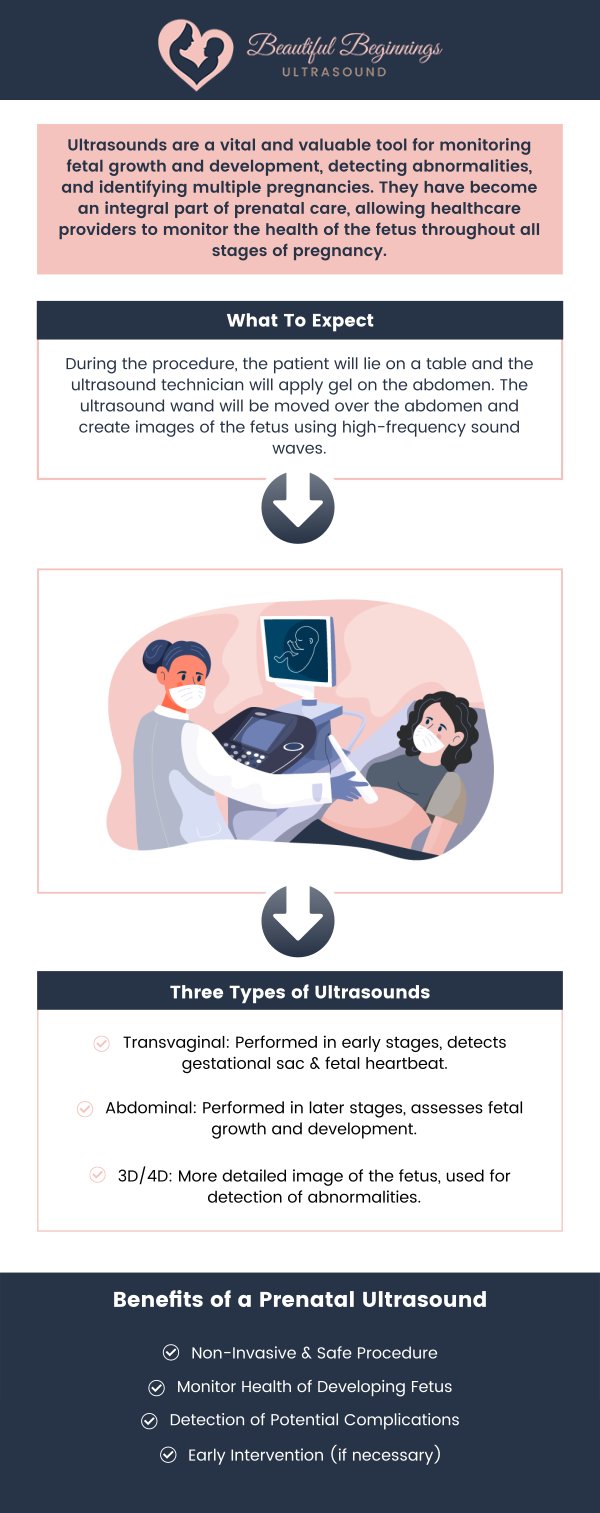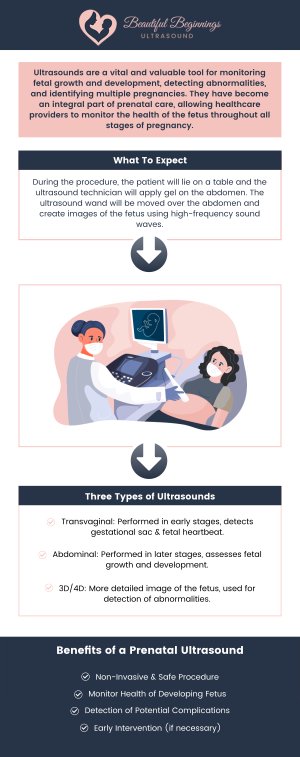Prenatal Ultrasound Clinic in Shrewsbury, NJ
Ultrasounds have become an integral part of prenatal care, providing valuable information about the developing fetus and allowing healthcare providers to monitor pregnancy health. However, there are still many misconceptions and questions about how ultrasound works and its role in pregnancy. Below, we will provide a comprehensive overview of ultrasound in pregnancy, including how it works, its benefits, and its limitations and risks. Visit Beautiful Beginnings Ultrasound Clinic today to get specialized and comprehensive care. For more information, contact us today or book an appointment online. We are conveniently located at 180 Ave at the Cmns Suite 9, Shrewsbury, NJ 07702.




Table of Contents:
What is an ultrasound in pregnancy?
When do you have your first prenatal ultrasound?
What can be detected in a pregnancy ultrasound?
How many ultrasounds do you have during your pregnancy?
An ultrasound (also called a sonogram) is a prenatal test offered to most pregnant women. It uses sound waves to show an image of your baby in the womb. Using ultrasound, your doctor can check your baby’s health and development.
The timing of your first ultrasound varies depending on your provider. Some people have a first-trimester ultrasound (also called an appointment ultrasound). This can occur as early as the seventh to eighth week of pregnancy. The provider performs an early ultrasound through your vagina (transvaginal ultrasound).
Ultrasound uses high-frequency sound waves to create images of the developing fetus. These sound waves are emitted by the ultrasound machine and bounce off the fetus, creating an image on the screen. This technology allows healthcare providers to monitor fetal growth, determine gestational age, and detect any abnormalities in the fetus. For example, ultrasound can detect structural abnormalities such as cleft lip or heart defects. It can also detect potential complications such as ectopic pregnancy or miscarriage.
One of the main benefits of ultrasound is that it is non-invasive and does not harm the fetus or mother. Ultrasound is also an effective tool for identifying potential pregnancy complications, allowing healthcare providers to intervene early and provide appropriate care. For example, if a healthcare provider identifies a potential complication such as preterm labor, they can take steps to prevent premature birth. Ultrasound can also help identify birth defects, allowing parents and healthcare providers to prepare for any necessary medical interventions.
Prenatal care is an essential aspect of a healthy pregnancy. One of the most common procedures during prenatal care is an ultrasound. Ultrasounds are used to monitor fetal growth and development, detect abnormalities, and identify multiple pregnancies.
Ultrasound during pregnancy is a non-invasive procedure that uses high-frequency sound waves to create images of the fetus. There are three types of ultrasounds: transvaginal, abdominal, and 3D/4D. Transvaginal ultrasound is performed in the early stages of pregnancy to detect the gestational sac and fetal heartbeat. Abdominal ultrasound is performed later in pregnancy to assess fetal growth and development. 3D/4D ultrasound provides a more detailed image of the fetus and can be used to detect abnormalities. Ultrasound is typically performed during the first trimester to confirm the pregnancy and estimate the due date. Additional ultrasounds may be performed throughout the pregnancy to monitor fetal growth and development.
Ultrasound during pregnancy has several benefits. It can detect fetal abnormalities, such as neural tube defects and Down syndrome. It can also assess fetal growth and development, including the size of the fetus, the amount of amniotic fluid, and the position of the placenta. Ultrasound can also identify multiple pregnancies, which can lead to a higher risk of complications during pregnancy and delivery. However, there are also risks associated with ultrasound during pregnancy. Exposure to high-frequency sound waves has not been proven to cause harm to the fetus, but some studies suggest that it may affect fetal development. Additionally, there is a risk of misinterpretation of results, which can lead to unnecessary interventions or missed abnormalities.
Preparing for an ultrasound during pregnancy is simple. It is recommended to drink water before the procedure to fill the bladder, which helps to create a clearer image of the fetus. Loose clothing is also recommended to allow easy access to the abdomen. During the procedure, the patient will lie on a table and the ultrasound technician will apply gel to the abdomen. The ultrasound wand will then be moved over the abdomen to create images of the fetus. The technician will identify fetal organs and structures, measure fetal size, and detect abnormalities if present. The results of the ultrasound will be interpreted by a radiologist or obstetrician and shared with the patient during a follow-up appointment.
Ultrasound during pregnancy is a valuable tool for monitoring fetal growth and development, detecting abnormalities, and identifying multiple pregnancies. While there are risks associated with ultrasound, they are generally considered to be minimal.
Preparing for an ultrasound is simple and the procedure itself is non-invasive. By providing a comprehensive guide to ultrasounds during pregnancy, we hope to alleviate any concerns or confusion that expectant mothers may have about this important aspect of prenatal care. We serve patients from Shrewsbury NJ, Red Bank NJ, Little Silver NJ, Eatontown NJ, Middletown NJ, Colts Neck NJ, Rumson NJ, Holmdel NJ, Long Branch NJ, West Long Branch NJ, Ocean City NJ, Oceanport NJ, and Surrounding Areas.

Check Out Our 5 Star Reviews


Additional Services You May Need
▸ 3D Ultrasound Imaging
▸ 4D Ultrasound Imaging
▸ 5D Ultrasound Imaging
▸ 3D and 4D Ultrasound
▸ Elective Ultrasound
▸ Early Gender Determination
▸ Prenatal Ultrasound
▸ Ultrasound Imaging
▸ Ultrasound Scans
▸ 12k Imaging

Additional Services You May Need
▸ 3D Ultrasound Imaging
▸ 4D Ultrasound Imaging
▸ 5D Ultrasound Imaging
▸ 3D and 4D Ultrasound
▸ Elective Ultrasound
▸ Early Gender Determination
▸ Prenatal Ultrasound
▸ Ultrasound Imaging
▸ Ultrasound Scans
▸ 12k Imaging




